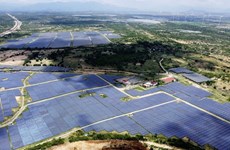Decrees drive urban development in Vietnam
Cities and towns worldwide are facing major sustainability challenges.
Deputy Minister of Construction Nguyen Thanh Nghi told Kinh te - Do thi
(Economics and Cities) newspaper what Vietnam is doing to aid urban
systems.
Cities and towns worldwide are facing major sustainability challenges.
Deputy Minister of Construction Nguyen Thanh Nghi told Kinh te - Do thi
(Economics and Cities) newspaper what Vietnam is doing to aid urban
systems.
* In the context of rapid urbanisation, has Vietnam adopted any pro-active plan to cope with climate changes?
According to assessments by foreign organisations, Vietnam is one of the countries being the most impacted upon by climate change. Our cities are facing challenges from storms and typhoons, heavy rains, flash floods, land erosion, droughts and rising sea levels.
Climate change is impacting on our urban systems in more and more obvious ways these days, it is affecting our economy, infrastructure, society and our natural environment.
Facing such a situation, it is imperative for us to adopt a workable strategy and development orientation, including appropriate planning and solutions to become resilient to climate change for the time being and also for many years to come.
The Vietnamese government has issued many legal documents guiding urban development in our country in the context of climate change, including the National Strategy on Climate Change, the Strategy on National Environment Protection (2003), Strategic Orientation for National Sustainable Development (the Vietnam Agenda 21 which was adopted in August 2004) and the National Strategy on Green Growth from 2011-20 and a document on the overall vision by 2050.
To turn these legal documents into reality, the Ministry of Construction (MoC) has been in the process of developing a framework relating to guiding the construction and urban development sector.
Of course, during the compiling process, climate change is an essential element integrated into all documents, particularly in the field of Construction Law, Housing Law, the Law on Urban Planning and others.
At present, MoC is compiling the Green Building Development Strategy from now till 2030 and a vision to 2050.
In addition, MoC has also submitted to the Prime Minister the proposal - Urban Development in Vietnam in Response to Climate Change - and is waiting for approval.
The proposal will serve as an important reference for the implementation of various programmes or projects gearing toward the development of green and resilient cities in the context of climate change.
* Government Decree 11/2013 is considered as a breakthrough in urban development in Vietnam. So in your opinion, what is the document's impact on urban development?
This decree has an immense significance. It comprehensively regulates all investment activities on urban development, including the work of planning to build a new urban area or to renovate, restore or upgrade the old towns.
The decree also regulates the establishment of Regional Urban Development Management Board with specific duties, including supervision tasks to ensure the project owners follow the blueprint designs which have been approved.
I'm confident the decree will help to make construction activities in our country more law abiding in future.
* Does the decree cover the idea of "community consultation" in urban development planning?
Under the decree, information disclosure on any urban development plan becomes a must. As a result, the community will be consulted right from the planning stage to construction.
Information disclosure will ensure the best use of available urban resources while limiting the negative impact of lawless development.
At the same time, the decree will serve as a solid foundation for the introduction of the urban green growth model.-VNA
* In the context of rapid urbanisation, has Vietnam adopted any pro-active plan to cope with climate changes?
According to assessments by foreign organisations, Vietnam is one of the countries being the most impacted upon by climate change. Our cities are facing challenges from storms and typhoons, heavy rains, flash floods, land erosion, droughts and rising sea levels.
Climate change is impacting on our urban systems in more and more obvious ways these days, it is affecting our economy, infrastructure, society and our natural environment.
Facing such a situation, it is imperative for us to adopt a workable strategy and development orientation, including appropriate planning and solutions to become resilient to climate change for the time being and also for many years to come.
The Vietnamese government has issued many legal documents guiding urban development in our country in the context of climate change, including the National Strategy on Climate Change, the Strategy on National Environment Protection (2003), Strategic Orientation for National Sustainable Development (the Vietnam Agenda 21 which was adopted in August 2004) and the National Strategy on Green Growth from 2011-20 and a document on the overall vision by 2050.
To turn these legal documents into reality, the Ministry of Construction (MoC) has been in the process of developing a framework relating to guiding the construction and urban development sector.
Of course, during the compiling process, climate change is an essential element integrated into all documents, particularly in the field of Construction Law, Housing Law, the Law on Urban Planning and others.
At present, MoC is compiling the Green Building Development Strategy from now till 2030 and a vision to 2050.
In addition, MoC has also submitted to the Prime Minister the proposal - Urban Development in Vietnam in Response to Climate Change - and is waiting for approval.
The proposal will serve as an important reference for the implementation of various programmes or projects gearing toward the development of green and resilient cities in the context of climate change.
* Government Decree 11/2013 is considered as a breakthrough in urban development in Vietnam. So in your opinion, what is the document's impact on urban development?
This decree has an immense significance. It comprehensively regulates all investment activities on urban development, including the work of planning to build a new urban area or to renovate, restore or upgrade the old towns.
The decree also regulates the establishment of Regional Urban Development Management Board with specific duties, including supervision tasks to ensure the project owners follow the blueprint designs which have been approved.
I'm confident the decree will help to make construction activities in our country more law abiding in future.
* Does the decree cover the idea of "community consultation" in urban development planning?
Under the decree, information disclosure on any urban development plan becomes a must. As a result, the community will be consulted right from the planning stage to construction.
Information disclosure will ensure the best use of available urban resources while limiting the negative impact of lawless development.
At the same time, the decree will serve as a solid foundation for the introduction of the urban green growth model.-VNA













